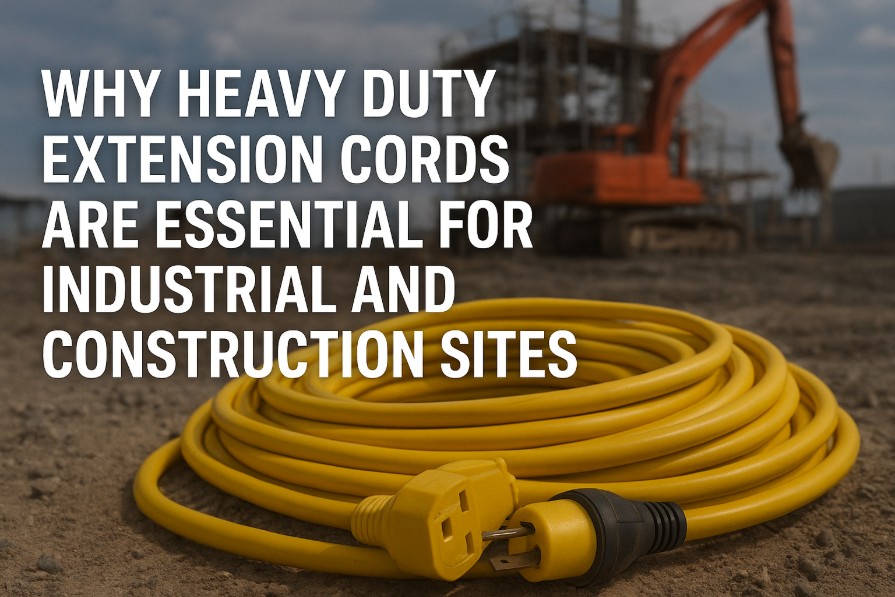Why Heavy Duty Extension Cords Are Essential For Industrial And Construction Sites
Every construction site and industrial facility is powered by electricity. In this context, machinery with power-hungry motors requires a constant power supply to keep projects on track.
However, when the sites are quite big and the outlets are frequently inaccessible, extension cords are really needed.
The problem? Cords are not all created equal. For example, a lightweight cord in these rigorous conditions can be a disaster. It may lead to overheating, damage to equipment, or even the danger of electrical shock.
That is why industrial and construction sites should not compromise on heavy-duty extension cords.
Designed to support higher power loads, resist wear and tear, and withstand extreme conditions, these cords provide a reliable and steady source of electricity. They are not only a convenience but a necessity and an essential safety and productivity measure.
Read on to find out why using heavy-duty extension cords is critical to the safety of workers, equipment, and the success of your projects.
1. Meeting High Power Demands
Industrial and construction equipment use significantly more electrical power than typical household appliances. Tools such as compressors, welders, and saws may require a significant amount of amperage, and the standard cords often cannot handle it.
On that note, a small cord may cause overheating, a voltage drop, or even equipment damage. Conversely, heavy-duty cords, which have a higher gauge of wire, such as 10/3 or 12/3, are constructed to handle such higher currents safely.
To be safe, you should obtain a heavy duty extension cord from reliable suppliers that offer tested and rated quality. It ensures that the tools are supplied with steady electricity to operate at an optimal level, allowing operations to remain smooth and teams to be productive.
2. Safety on Demanding Sites

There can be numerous hazards at construction sites. For this reason, electrical safety is always a top priority. Small or insufficiently insulated cords pose a greater risk of shock, short circuiting, or even fire, especially in the presence of flammable substances.
These risks are addressed by heavy-duty extension cords. They have reinforced insulation, proper grounding and specialized jackets that can withstand moisture, oils and temperature extremes. So, they are designed for outdoor use. Some are specifically designed to suit rugged and high-risk environments.
The result? Heavy-duty cords can protect workers, tools, and structures by reducing the risk of overheating or accidental contact with live wires. This onsite safety is not merely a regulation, but an obligation, and these cords are critical to its performance.
3. Sturdiness in Extreme Environments
In contrast to a clean home or office, construction sites are often untidy, chaotic, and harsh on equipment. Speaking of which, extension cords are continually subjected to mud, concrete, oil, sharp objects, load-bearing machinery, and foot traffic.
An ordinary domestic cord would either fray, crack or come to an early end under such circumstances. Heavy-duty cords, on the other hand, are rugged jackets with flexible designs that provide resistance to abrasions, crushing, and environmental wear.
Most of them also do not become brittle and fracture, as they may remain stable even at freezing temperatures. Their longevity makes cords tough enough to endure daily wear and tear without becoming unusable.
Overall, this durability is transferred to increased life expectancy, dependability, and minimized maintenance expenses.
4. Avoiding Downtime and Expensive Delays
Each minute spent on a construction or industrial site incurs a cost. Electrical malfunctions or breakdowns of equipment due to faulty cords can stall work, pushing back schedules and exceeding budgets.
Broken cords also require instant replacement, introducing additional delays. The heavy-duty extension cords can be used to avoid such setbacks by providing steady, reliable power and resisting adverse conditions. Their reliability minimizes unexpected failures. Also, their capacity makes the equipment run continuously.
Hence, managers can save time and costs by investing in heavy-duty cords, enabling projects to be completed and keeping workers productive.
5. Onsite Flexibility and Versatility
Large extension cords are incredibly versatile in dynamic job sites. They are available in various lengths, gauges and configurations to suit specific needs.
In this regard, shorter and heavier cords should be used on power-hungry tools that are close to outlets. You can also use longer cords with rough jackets to easily reach outlets that are far away.
Moreover, lighted ends are common in many models to ensure that power is flowing, and connector locking to prevent them from slipping when unplugged. Not only that. Some have colored insulation jackets to ensure they can be seen and prevent accidental unplugging.
These considerate design features increase convenience, safety and ease of use. In short, flexibility is important in high-pressure settings, and heavy-duty cords will allow you to have power when you need it most.
6. Adherence to Safety Standards

Industrial and construction projects require adherence to stringent safety provisions to safeguard workers and prevent costly fines. Electrical devices such as extension cords are no exception.
Fines, liability action, or even closure of the site can be caused by non-compliant cords. That is why heavy-duty extension cords are designed to comply with or exceed standards, such as OSHA, as well as UL or CSA listings. This certification ensures that they are both tested and safe, and can be used in harsh environments.
In other words, using compliant cords not only promotes workplace safety but also demonstrates that a company values professionalism and regulatory responsibility.
Conclusion
Heavy-duty extension cords are far more than simple power conduits—they are essential tools that safeguard workers, protect equipment, and keep projects running efficiently. Built for extreme conditions, high loads, and strict safety standards, they combine durability, reliability, convenience and compliance.
Thus, investing in quality extension cords ensures consistent power, minimizes downtime, and supports productivity in any industrial setting.







